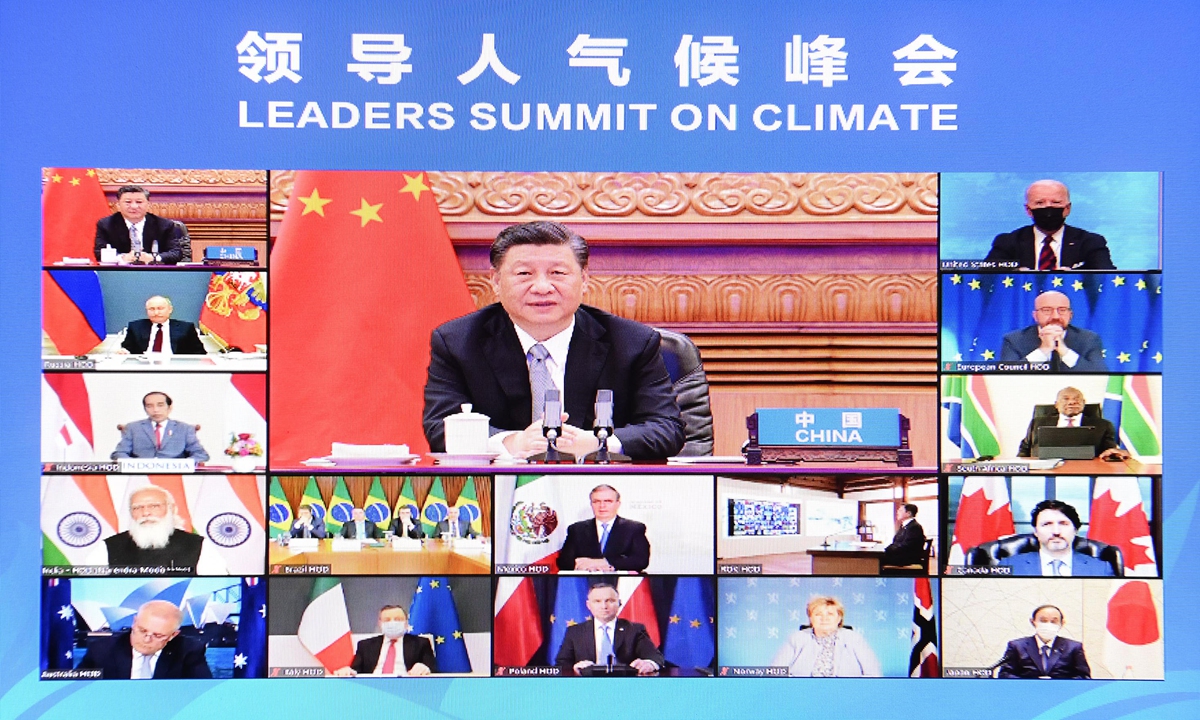
Photo: Xinhua
China is committed to achieving its major targets on fighting climate change, including realizing a carbon emissions peak in 2030 and achieving carbon neutrality in 2060, calling for jointly building a community for man and nature, Chinese President Xi Jinping announced at the World Leaders’ Climate Summit on Thursday.
In the face of unprecedented difficulties in global environmental governance, the international community must take unprecedented ambitions and actions, bravely shoulder responsibilities, and work together to build a community for man and nature, Xi told the summit from Beijing via video link.
US President Joe Biden pledged in his opening remarks at the summit to cut US greenhouse gas emissions in half by 2030 compared to 2005 levels, a target that would nearly double America’s previous commitment when signing the Paris Agreement, which is to reduce its emissions about 28 percent below 2005 levels by 2025.
Biden invited 40 world leaders to participate in the climate summit on Thursday, which is also Earth Day, in a bid to put the US back to the forefront of global efforts to deal with climate change. Some major climate issues such as reducing emissions to keep a limit to warming of 1.5 C within reach, mobilizing public and private finance to drive net-zero transition and helping vulnerable countries cope with the climate impact, and spurring transformational technologies that can help reduce emissions, according to an agenda released on the website of the White House.
“We need to work on the basis of international law, follow the principle of equity and justice, and focus on effective actions. We need to uphold the UN-centered international system, comply with the objectives and principles laid out in the UN Framework Convention on Climate Change (UNFCCC) and its Paris Agreement, and strive to deliver the 2030 Agenda for Sustainable Development... We must join hands, not point fingers at each other; we must maintain continuity, not reverse course easily; and we must honor commitments, not go back on promises,” President Xi said.
Xi also said that China welcomes the US coming back to the multilateral governing process on climate issues, and China and the US just issued a joint statement on responding to the climate crisis, and China is expected to work with the international community, including the US, in pushing forward the global agenda.
“China would not bring forward new goals, but China will gradually detail its existing goals, such as the coal industry reaching the carbon emissions peak earlier,” Li Junfeng, former director general of China's National Center of Climate Change Strategy Research under the National Development and Reform Commission, told the Global Times on Thursday.
Unlike the EU and China, where the governments could literally lead the practice of policies on climate change, implementing Biden’s climate plans could be largely discounted in some national organs and local states still under the Republicans’ control, Li said, noting that due to the political system of the US, there would be a huge uncertainty on climate issues in the US.
China will include carbon emissions peaking and carbon neutrality into the country’s whole layout of building an eco-civilization, and is working on plans of carbon emissions peaking, said Xi. He said China is supporting places and key industries which have the ability to reach the peak first, and China will impose strict regulations on the coal power industry.
Xi also vowed to prioritize ecological civilization into the China-proposed Belt and Road Initiative (BRI). China has launched a green action proposal and is taking green infrastructure, energy, transportation, finance and a slew of other green measures to benefit people of BRI countries.
The Chinese president said that the time it takes for China to realize carbon emissions peak in 2030 and carbon neutrality in 2060 is far shorter than it takes for the developed countries, which requires arduous work from China.
He also stressed “six commitments,” namely commitments to harmony between man and nature; green development, to systemic governance, to people-centered approach, to multilateralism, and to the principle of common but differentiated responsibilities.



